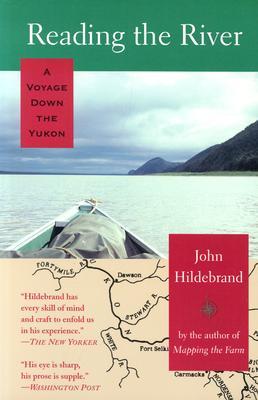Jacket illus. credit: goodreads.com
John Hildebrand is an exceptional writer. His reviewers call him a latter-day Thoreau, and the best adventure writer since Jack London. He uses this skill to take you on a three-month, 2,000 mile trip by canoe down the Yukon River, and when you reach the last page, you’ll likely share my sense of emotional collapse over the trip being done. He not only writes so you can nearly smell the smoke and hear the snapping and crackling of your shared driftwood campfire, but he’ll take you to every village and fish camp along the river where he’ll introduce you to the Alaskan frontiersmen willing to share their own stories. There are survivors of the days of the Alaskan gold rush, Eskimos, Athabascan Indians, wilderness homesteaders, subsistence hunter/trapper/fishermen, dogsled mushers, missionaries, and Russian family members still reflecting the days when Russia provided the greatest influence in the area. He’ll share his salmon catch, or take you along as he helps pull salmon nets, have you sing your way through the wilderness so the grizzlies know you’re there, sleep in tents, cabins, and the homes of ‘river angels.’
John and his wife had dreamed of homesteading in the Alaskan wilderness. He cut and dragged the logs, trimmed and shaped them, notched the ends and stacked them, and stuffed the chinks between the logs, and roofed it until he had completed a log cabin. He cut and split wood to heat the cabin with a wood-burning metal stove, and through the seasons grew or hunted for all their food. After all of this, his wife’s biggest complaint was that there was nothing to do, and she found she was no longer enamored of their dream. Finally, after losing a child shortly after birth, she went back south. John followed, hoping to save their marriage, but she finally divorced him, and of course took everything he had except the cabin she wanted nothing to do with.
After a decade, the author returned to Alaska, but found he just couldn’t go back to the cabin, so he started his trip down the Yukon. The title, Reading the River, is misleading. The story is nothing about reading a river to find one’s way through the river‘s eddies, rapids, and shoals, but more about navigating through life’s hazards and obstructions. In the process, he gives you an experience you’ve probably never had before. When the canoe trip ends, in a final twist, we find him…., well, you need to follow along to see where the trail leads. Your only regret after reading this book will be that there’s not another 300 pages or so.

No comments:
Post a Comment